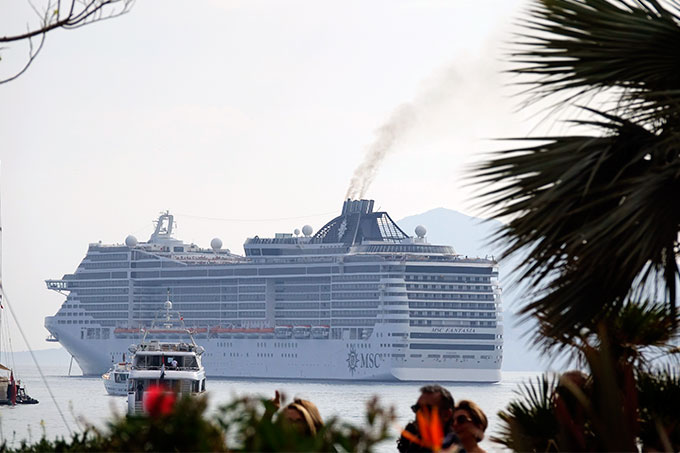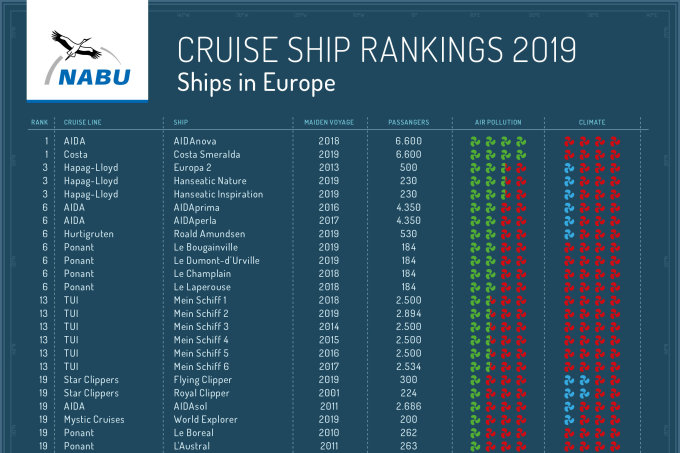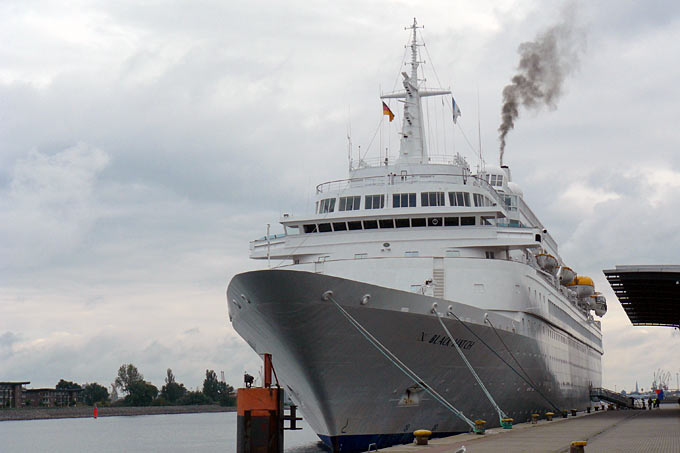Air is becoming slightly cleaner, while climate footprint is worsening
NABU presented Cruise Ship Ranking 2019

Foto: Peter Seyfferth
21th August 2019 This Wednesday NABU presented its cruise ship ranking 2019. The findings of this year’s evaluation demonstrate that only a small proportion of fleets is becoming cleaner, while the industry by large continues to rely on heavy fuels and fails to employ exhaust technology.
Climate footprint of cruise ships is especially worrying: All ships are fuelled by fossil fuels producing enormous greenhouse gas emissions. Two sailing ships alone are scoring better, but they do not represent a commonplace type of ship.
NABU CEO Leif Miller comments: „The cruise ship industry’s failure to em-brace climate protection is a slap in the face of our youth. Nobody can pretend to be unaware of today’s climate crisis - it is our joint responsibility to act now. Nevertheless, suppliers flood the market with more giant vessels every year, all being operated by fossil fuels. That’s not keeping up with the times and it is irresponsible, too. Cruise ships can only have a future if they use zero-emission technologies.”
According to NABU, heavy fuel operated Diesel engines still dominate the scene. Recently more and more cruise ships started to include LNG engines, but LNG is still entirely a fossil fuel and its extraction process is in part heavily damaging to the environment. In addition, one has to take into account the so-called methane slip, by which the highly potent greenhouse gas methane is emitted into the atmosphere. While gas powered engines hence do emit less air pollutants in comparison to marine diesel and heavy fuels, they are not performing better in terms of the fleet’s climate footprint

Cruise Ship Ranking (click to enlarge) - for more information click here
Daniel Rieger, head of transport policy, adds: „Tax exemptions for marine fuels are fatal in the view of today’s climate crisis and urgently need to be ended. As long as the use of fossil fuels is massively subsidized and emission and energy efficiency standards of ships remain derisory, a switch to zero-emission engines will not take effect. We urgently need to make the regulato-ry framework tighter in order to foster development and broader use of zero emission technologies in the shipping industry. It’s the only way to make the industry climate-neutral by 2050.”
This year NABU covers technologies in the field of energy supply and propul-sion systems for the first time listed as a separate category. Two sailing ships alone as well as those ships with a shore power connection, using electricity from renewables while in port, are scoring better. Hurtigruten sets new standards with their hybrid ship “Roald Amundsen” - while they still employ diesel-electric engines, their energy efficiency gain reduces C02 emissions.
In the category of air pollutants German ship owner AIDA comes first with its newest model AIDAnova. AIDA’s Italian parent group Costa Crociere is on a par with its LNG operated “Costa Smeralda”. The third place is awarded to three ships of shipping company Hapag-Lloyd: “Europa 2”, winner of the year 2013, as well as the new expedition cruise ships “Hanseatic Nature”, and “Hanseatic Inspiration”. Far behind the industry’s giants MSC and Royal Carribean take the last place at all times. German company TUI Cruises has downgraded to a 13th place.
Particle filters and nitrogen oxide catalysts are still rarely used. At least French supplier Ponant is the first company having announced to voluntarily phase out heavy fuel oil setting the course for a timely exhaust gas treatment. Meanwhile, NABU demands that all companies replace heavy fuel oil with a comprehensive use of exhaust technology for all ships.
Malte Siegert, head of climate policy at NABU Hamburg: „A comprehensive reduction of air pollutants is technologically possible and also economically feasible for a mere fraction of the construction costs of a new ship. It’s a scandal that we still see ships today which are built with a standard that dates back to decades ago. Technologies for new constructions as well as retrofitting are widely available. It is crucial to make these new standards mandatory and to have them installed in all ships as soon as possible. In addition, mandatory shore power connections are long overdue for all European ports. In order to do so, cruise ship companies need to make a genuine commitment, but apart from this ports like Hamburg need to employ shore power plants more widely i.e. not only in Altona but at the harbor city and Steinwerder terminals, too.”
More information
The Aida Nova is the world's only liquefied natural gas (LGN) cruise ship. She is unfortunately an exception, because all the others continue to sail with the dirtiest of all fuels: heavy oil. more →

